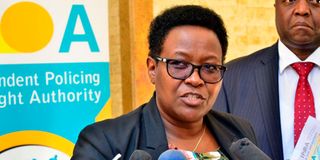Study: Police watchdog Ipoa could learn from peers to foster accountability

Independent Policing Oversight Authority (Ipoa) Chairperson Anne Makori during a past media briefing in Nairobi.
What you need to know:
- Well established and functioning independent investigative agencies, the study found, contribute to police accountability.
- To be effective and have public trust, the agencies need independence, strong powers and transparency.
A recent study by the Open Society Foundations highlights Kenya’s Independent Policing Oversight Authority (Ipoa) as an example of an important agency that fosters police accountability and greater justice for victims of alleged crimes by police.
“Who Polices the Police? The Role of Independent Agencies in Criminal Investigations of State Agents” reflects on the practices of Ipoa and 14 other independent agencies and prosecutorial departments that investigate police around the world.
Well established and functioning independent investigative agencies, the study found, contribute to police accountability with respect to fair-trial rights of the involved agents and victims’ rights. To be effective and have public trust, the agencies need independence, strong powers and transparency.
Ipoa’s history is instructive and inspiring, having been set up following the work of the 2008 Commission of Inquiry into Post-Election Violence. What is unique is that Ipoa was designed as part of overall constitutional reforms. The agency therefore draws its powers from the Constitution, whose overall message is that policing should be accountable.
Ipoa manages to fulfil its mandate in a difficult security environment covering a large territory. The 2016 murder of Willy Kimani, a lawyer who represented a victim in a police complaint case supported by Ipoa, is a stark reminder of the dangers, and the need to protect witnesses and victims.
What Ipoa can learn from others?
The policing oversight agency in Jamaica, the Independent Commission of Investigations (Indecom), took a much more proactive approach to assert it powers. By bringing charges against the police for lack of cooperation, it showed one way of dealing with the challenge of lack of cooperation by the police.
Independent leadership
While the police sued Indecom on several occasions, the final verdict in 2020 by the Privy Council resolved the matter, confirming Indecom’s powers to lay criminal charges against the police for obstruction of justice, when they refuse to cooperate or destroy evidence.
The study also finds that for investigative agencies to be effective, they require independent and responsible leadership, especially when it comes to taking decisions on whether to charge a police officer or another state agent.
This rests with the director of the agency in some countries or the prosecution service per the recommendations of the director. For example, in Ontario, Canada, the director of the Special Investigations Unit, which oversees the province’s police, is personally responsible for such decisions.
But in Kenya, the recommendation rests with the board, an aspect that, though it dilutes individual responsibility, could protect the leadership of Ipoa from undue pressure. The study recommends clearly identifying who is responsible for the decisions of an independent agency.
In Kenya, only prosecutors can make decisions about whether to bring charges against someone, including when it comes to police abuses. The study highlights that cooperation between investigators and prosecutors is critically important.
Prosecutors also need to be specialised in handling cases involving police and other state agents. They should report back to the director of the agency on their decisions.
Effective investigation
The study recommends that the director of an agency like Ipoa be allowed to issue public statements if there are cases where the agency recommended charges but the national prosecuting authority decided not to take the case forward.
Often, when a case is prosecuted, the public sees the result in the form of a verdict. But if the case does not get to trial, every actor in this decision should explain their decision to the public.
An investigation targeting the police always needs strong evidence. The study shows that one of the most important powers of an independent agency is to be able to attend every incident scene involving police.
In Jamaica, Indecom staff attend every police shooting scene, which is made easier by the fact that they have three offices covering a comparatively small country. The Independent Police Investigative Directorate (Ipid) in South Africa reports attending some two thirds of incident scenes.
The study shows that if an independent agency cannot attend the scenes involving police, and does not have its own crime scene examiners, it can lose the most critical evidence necessary for an effective investigation.
The study underscores the need to cooperate with civil society organisations that often serve as a first point of contact with victims. In addition, they can be a source of important evidentiary material and information, while providing support and protection to victims.
Starting to hold police accountable is difficult in any context. Ipoa has overall public support, legitimacy, strong founding legislation and competent staff. It meets a lot of challenges.
But it can continue developing its tools and expertise, be more assertive, learn from others and share their lessons, and continue ensuring that no one, including the police, should be above law.
Kegoro is the executive director of the Open Society Initiative for Eastern Africa.
Lisitsyna is a senior managing legal officer at the Open Society Justice Initiative and a co-author of the study, ‘Who Polices the Police? The Role of Independent Agencies in Criminal Investigations of State Agents.’





